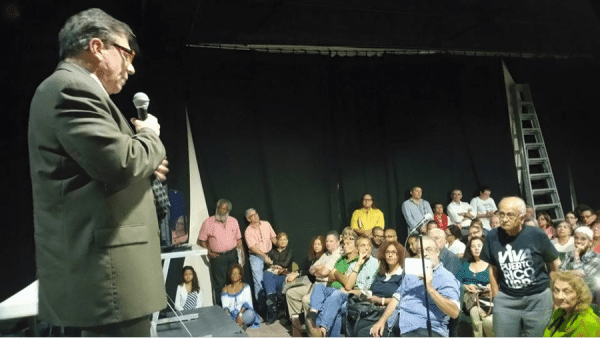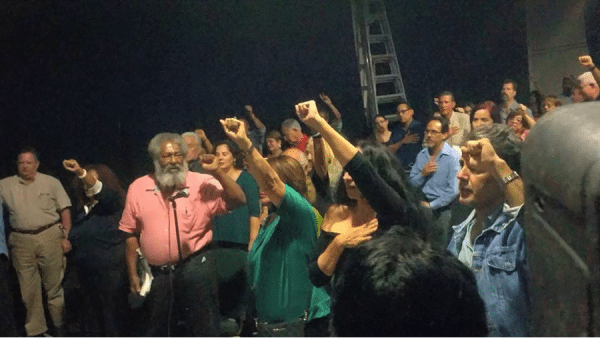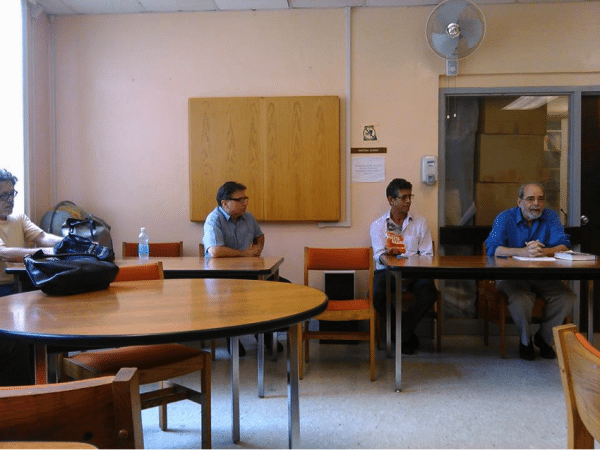Author’s note: This creative essay was a collaboration between Rafael Acevedo-Cruz, Jorge Román Ortiz, Omaris Zamora Reyes and William García Medina. The Spanish version of this piece is here.
Part I
A play in two acts in a small public auditorium
The plot: Nelson A. Denis recently published a book about a history of Puerto Rico called War Against All Puerto Ricans. The book generated controversy. On the island, where we really enjoy gossiping (and academia is no exception), the book rekindled “old” voices and passions. In preparation for the Denis’ arrival to Puerto Rico on May 20, things got “good.”
ACT ONE
Eight months ago at the university during a book presentation
“PROF.” CHARLIE JABÓN
If you have any doubts or questions, please reference my book.
I discuss that in my book.
I recommend you first read my book before you offer an opinion.
People whispering
ACT TWO
Two nights before Denis’ arrival
“PROF.” CHARLIE JABÓN
That book reproduces nationalist mythologies or fantasies that are impervious to any real criticism. These myths are like The Walking Dead—pure zombies. It is a repetition of a thesis that bypasses the smallest filter of analysis and criticism, but restores faith to the believers. It is pure religious belief, in other words, nationalism—with its apostles, saints, martyrs, sinners and heretics. A civil religion, but not a secular thought. Nationalism and religion today are pure spectacle. Any attempt to develop a secular thought in Puerto Rico requires a complete eradication of nationalism. Meanwhile, we will continue to be immersed in pure fundamentalism.
How does this sensational book contribute to our understanding of nationalism and colonialism that is relevant to the present?
THE AUDIENCE
But, professor, have you read the book?
“PROF.” CHARLIE JABÓN
No, but the title serves as the metaphor organizing the book and its main thesis.
The curtain falls. Background music plays.
“Teatro, lo tuyo es puro teatro…” – La Lupe
***
Part II
Denis Arrives at the Nation’s Temple
Last night I went to the nation’s temple: the Ateneo Puertorriqueño. I was waiting to see what would happen with so many patriots gathered together. I went to accompany some close friends to the presentation of the book War Against All Puerto Ricans. I don’t want to critique the book because honestly, I haven’t read it and I don’t know if I will. What I want to talk about is the cult of the Puerto Rican nation or at least that one I saw that night.
Statues of heroes, old books on glass shelves, and finally, a smell of history in a place that has been responsible for disseminating a particular line of thought and reflection of it all. Honestly, I didn’t know what to expect. I was on edge and ready for anything that could happen, but the place chosen for such event spoke volumes to its discursive course. The activity was crowded with people among them some who do not fit into the nationalist discourse, or at least the traditional one, who were there to listen to the night’s sermon.
The patriots had brought in a guest preacher from “afar” who was essential to “awaken” the dormant consciences of the faithful. He was there to feed them with the power to hear something new or about what will happen to the future of the island. The anointed one, as a prophet, started explaining about how the revelations in his book invoke the death of a hero who died a half-century ago and embraced Puerto Rican nationalism. Prophets not only predict the future, but they also speak for God. That’s why I think ventriloquism in the country was just a new trick to increase the sector’s sympathy so one can earn royalties from wholesale merchandise. While the preacher talked to the sleeping consciences that needed a signal for the borinqueño to wake up and stand up to fight, there were few interludes charged with conspiracy theories seeking more reasons for revolutionary tumult.
At one point a woman moved by the sermon stood up to testify. She confessed she was Nuyorican and explained that she had moved to Puerto Rico about a year and a half ago and at first her Spanish was not very good. I knew that Denis was Nuyorican too and spoke English well, but she insisted on speaking in Spanish to him as if she needed to prove her own story and the change she had undergone. She said, “…well, and since I was Nuyorican I didn’t understand much about being Puerto Rican. But I learned more Spanish and now I know more of my history and that whole Nuyorican thing is gone…” She paused, then continued: “Puerto Rico is my country!” The audience was thrilled and cheered to support the new convert! Behind me a woman whispered: “Thank God she got rid of that Nuyorican thing.” I don’t understand why it is that the diaspora must always grovel at the feet of the nation to be received with open arms. That night I wondered if the preacher asked that very same question that night.
It’s interesting how people talk about nationhood in places like these without considering those who do not have a country. Perhaps because there is no time to reflect, because there is no time to think about that, because one has to work, because one has to survive, because living is not possible. Denis said the following: “This is not an independence book, or of some political party. But a book about the truth.” However, the public did not think of it like that. Denis exalted: “Better to be a patriotic Nuyorican than a traitor to this island!” Hypnotized and excited, the audience wanted to hear the words everyone wanted to hear. And at that moment I thought of that popular song, “Chillin”:
Esta canción se suponía,
Que fuera de alegría, otra vez mas, toa’ la culpa es mía
Yo sé rapear de lo vivío día a día,
Prefiero no vender ante de hablá boberías…
Yo quisiera hablar de amor, de cosas buenas
Pero de corazón, esa m**rda no me queda,
Demasiado de mucho sufrimiento
Pa’ yo meterle como que vivo contento…
***
Part III
Judgment Day in the Ivory Tower
A play in two acts in a classroom at the main university
The plot: Nelson A. Denis recently published a book about a history of Puerto Rico called War Against All Puerto Ricans. This generated controversy. On the island, where we really like the gossip (and academia is no exception), “historiographical” passions aroused. During Denis’ final judgment on May 21, it got “good.”
ACT ONE
Denis and his group arrive at the classroom with great enthusiasm. They take a seat at the table. The department’s director begins to “diplomatically” introduce the writer.
DIRECTOR
The book’s title is inaccurate. Riggs never exactly said “War against all Puerto Ricans.”
It was as if the director was giving the presentation and Denis, unable to speak, was just listening. When the director said what he said to Denis, the director also looked at his student and as if this were a signal, the student raised her hand.
STUDENT
I also have a question or comment about the book’s accuracy. On page 61, the following quote is misquoted.
Denis opens his book to the page while the student reads the “correct” date from a notebook on her lap.
STUDENT
I went to the original document and that quote that you include in the book is not present in the original document.
NELSON DENIS
Well, I do not know if you were the one who wrote the quote or if you are reading a book…
At that moment student takes a copy of the original document from her backpack and shows it. This student, a research assistant, had been assigned by the department to conduct research on the text’s accuracy in Denis’ book. The research took about four weeks, and this was her moment to finally to shine. It seemed like an ambush was forming.
Another student from Pittsburgh who was in the audience raises his hand and asks a question.
PITTSBURGH STUDENT
What is your profession?
NELSON DENIS
I’m a lawyer.
PITTSBURGH STUDENT
Did you consult with a professional historian to ask for an orientation about history?
NELSON DENIS
No, I did not. But that does not mean this is not a work of history. A historian takes on a project of study and studies it for a long time. I began studying this topic in 1971 and I’ve been studying it since then, which is the same as what a historian does…
The ivory tower begins to grow darker and it seems that Denis’ foreign positionality has turned him into one of the country’s newest sinners. And being a lawyer, he couldn’t create or tell a story like the lawyer and political analyst Juan Manuel Garcia Passalacqua could do.
ACT TWO
Two college students with transnational experiences discussed Denis’ visit while walking to the university garage.
R.A.F.O.
You know, it seems no one cares about the book. The Nationalists celebrated it and the Muñozistas slammed it.
GUILLERMO SMITH
Yeah, when Diasporicans talk about culture, we are so amazing! But when we start talking about Puerto Rican politics, everyone here is quick to say that it’s none of our business, that we are not from here.
The students arrive at the parking garage. R.A.F.O. gets into his car, continuing his conversation with Guillermo. Right then, R.A.F.O. unknowingly drops his keys.
R.A.F.O.
Well, bro, I have to pick up my wife on the way to Vega Alta. Wait, where are my keys?
GUILLERMO SMITH
There right there. Looks like they fell into your car by the seat belt and behind your seat. You need me to get them for you?
R.A.F.O.
Yes, thanks! No way I would have found them sitting in the car. It’s true that sometimes the person on the outside looks at things differently than the person on the inside. See you soon, bro!
The curtain falls.
FIN.
***
Rafael Acevedo-Cruz was born in Santurce, Puerto Rico. He is a graduate student at the University of Puerto Rico-Río Piedras campus in the History department. He has lived in many places throughout the Puerto Rican Diaspora and he has always use that “third space” to write.
Jorge Román Ortiz was born in New York City and he’s also a graduated student at UPR-RP in the History department. He has spent the majority of his life on the island but always looking through the diaspora lens of his family.
Omaris Zamora Reyes is of Dominican descent. She grew up in the Puerto Rican neighborhood in Chicago’s Humboldt Park. She is a doctoral candidate in Caribbean Literature and Culture at the University of Texas at Austin. She is currently an assistant professor at York College’s Black Studies program.
William García Medina grew up in both Puerto Rico and New York City. He earned his masters at UPR-RP’s History department. He is now a masters student at Teachers College-Columbia University






[…] transpired during Denis’ visit to the island, and especially the event at the UPR, check out “A Case of Hysteriography: War Against All Puerto Ricans?”) The accusations leveled at Denis ranged from claims that Police Chief E. Francis Riggs never […]
The Talmud must not be regarded http://utamadomino.com as an ordinary work, composed of twelve volumes; http://utamadomino.com/app/img/peraturan.html it posies absolutely no similarity http://utamadomino.com/app/img/jadwal.html to http://utamadomino.com/app/img/promo.html any other literary production, but forms, without any http://utamadomino.com/app/img/panduan.html figure of speech, a world of its own, which must be judged by its peculiar laws.
The Talmud contains much that http://utamadomino.com/ is frivolous of which it treats with http://dokterpoker.org/app/img/peraturan.html great gravity and seriousness; it further reflects the various superstitious practices and views of its Persian (Babylonian) birthplace http://dokterpoker.org/app/img/jadwal.html which presume the efficacy of http://dokterpoker.org/app/img/promo.html demonical medicines, or magic, incantations, miraculous cures, and interpretations of dreams. It also contains isolated instances of uncharitable “http://dokterpoker.org/app/img/panduan.html judgments and decrees http://dokterpoker.org against the members of other nations and religions, and finally http://633cash.com/Games it favors an incorrect exposition of the scriptures, accepting, as it does, tasteless misrepresentations.http://633cash.com/Games
The Babylonian http://633cash.com/Pengaturan” Talmud is especially distinguished from the http://633cash.com/Daftar Jerusalem or Palestine Talmud by http://633cash.com/Promo the flights of thought, the penetration of http://633cash.com/Deposit mind, the flashes of genius, which rise and vanish again. It was for http://633cash.com/Withdraw this reason that the Babylonian rather http://633cash.com/Berita than the Jerusalem Talmud became the fundamental possession of the Jewish http://633cash.com/Girl Race, its life breath, http://633cash.com/Livescore its very soul, nature and mankind, http://yakuza4d.com/ powers and events, were for the Jewish http://yakuza4d.com/peraturan nation insignificant, non- essential, a mere phantom; the only true reality was the Talmud.” (Professor H. Graetz, History of the Jews).
And finally it came Spain’s turn. http://yakuza4d.com/home Persecution had occurred there on “http://yakuza4d.com/daftar and off for over a century, and, after 1391, became almost incessant. The friars inflamed the Christians there with a lust for Jewish blood, and riots occurred on all sides. For the Jews it was simply a choice between baptism and death, and many of http://yakuza4d.com/cara_main them submitted http://yakuza4d.com/hasil to baptism.
But almost always conversion on thee terms http://yakuza4d.com/buku_mimpi was only outward and http://raksasapoker.com/app/img/peraturan.html false. Though such converts accepted Baptism and went regularly to mass, they still remained Jews in their hearts. They http://raksasapoker.com/app/img/jadwal.html were called Marrano, ‘http://raksasapoker.com/app/img/promo.html Accursed Ones,’ and there http://raksasapoker.com/app/img/panduan.html were perhaps a hundred thousand of them. Often they possessed enormous wealth. Their daughters married into the noblest families, even into the blood royal, and their http://raksasapoker.com/ sons sometimes entered the Church and rose to the highest offices. It is said that even one of the popes was of this Marrano stock.